
The capybara or greater capybara is a giant cavy rodent native to South America. It is the largest living rodent and a member of the genus Hydrochoerus. The only other extant member is the lesser capybara. Its close relatives include guinea pigs and rock cavies, and it is more distantly related to the agouti, the chinchilla, and the nutria. The capybara inhabits savannas and dense forests, and lives near bodies of water. It is a highly social species and can be found in groups as large as 100 individuals, but usually live in groups of 10–20 individuals. The capybara is hunted for its meat and hide and also for grease from its thick fatty skin.

South America is a continent entirely in the Western Hemisphere and mostly in the Southern Hemisphere, with a considerably smaller portion in the Northern Hemisphere. It can also be described as the southern subregion of the Americas.

The Guiana Shield is one of the three cratons of the South American Plate. It is a 1.7 billion-year-old Precambrian geological formation in northeast South America that forms a portion of the northern coast. The higher elevations on the shield are called the Guiana Highlands, which is where the table-like mountains called tepuis are found. The Guiana Highlands are also the source of some of the world's most well-known waterfalls such as Angel Falls, Kaieteur Falls and Cuquenan Falls.
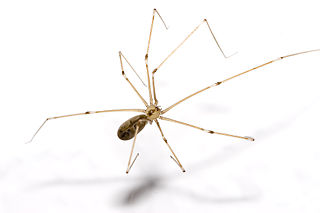
The Pholcidae are a family of araneomorph spiders. The family contains more than 1,800 individual species of pholcids, including those commonly known as cellar spider, daddy long-legs spider, carpenter spider, daddy long-legger, vibrating spider, gyrating spider, long daddy, skull spider, and angel spider. The family, first described by Carl Ludwig Koch in 1850, is divided into 94 genera.
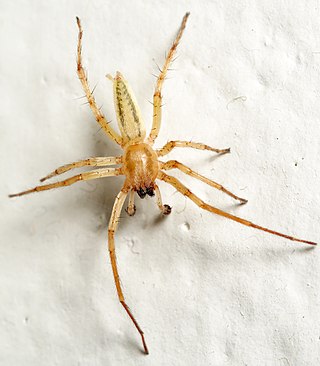
Anyphaenidae is a family of araneomorph spiders, sometimes called anyphaenid sac spiders. They are distinguished from the sac spiders of the family Clubionidae and other spiders by having the abdominal spiracle placed one third to one half of the way anterior to the spinnerets toward the epigastric furrow on the underside of the abdomen. In most spiders the spiracle is just anterior to the spinnerets.

Xanthosoma is a genus of flowering plants in the arum family, Araceae. The genus is native to tropical America but widely cultivated and naturalized in other tropical regions. Several are grown for their starchy corms, an important food staple of tropical regions, known variously as malanga, otoy, otoe, cocoyam, tannia, tannier, yautía, macabo, ocumo, macal, taioba, dasheen, quequisque, ʻape and as Singapore taro. Many other species, including especially Xanthosoma roseum, are used as ornamental plants; in popular horticultural literature these species may be known as ‘ape due to resemblance to the true Polynesian ʻape, Alocasia macrorrhizos, or as elephant ear from visual resemblance of the leaf to an elephant's ear. Sometimes the latter name is also applied to members in the closely related genera Caladium, Colocasia (taro), and Alocasia.

The Venezuela national football team, nicknamed La Vinotinto, represents Venezuela in men's international football and is controlled by the Venezuelan Football Federation (FVF), the governing body for football in Venezuela. Their nickname is a reference to the unique “red wine” team color that is used on their home jerseys. When playing at home in official games, they usually rotate between three stadiums: The Polideportivo Cachamay in Puerto Ordaz, the Estadio José Antonio Anzoátegui in Puerto La Cruz and the Estadio Pueblo Nuevo in San Cristóbal. In friendly matches, they tend to rotate between the rest of the stadiums in the country.
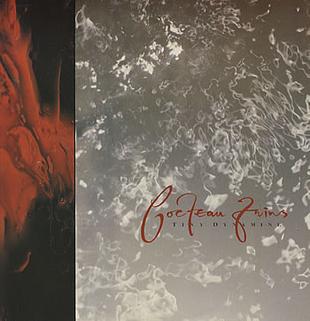
Tiny Dynamine is an EP by Scottish alternative rock band Cocteau Twins, released on 4AD Records. The EP featured four non-album tracks. It was issued on 15 November 1985, two weeks prior to another EP, Echoes in a Shallow Bay. The two EP sets, which featured complementary artwork, were also released as a combined double EP in a gatefold cover and as an eight-track CD. The EP was later included in its entirety on the 1991 compilation The Box Set and the 2005 singles/EP collection Lullabies to Violaine.

Pouteria is a genus of flowering trees in the gutta-percha family, Sapotaceae. The genus is widespread throughout the tropical Americas, with outlier species in Cameroon and Malesia. It includes the canistel, the mamey sapote, and the lucuma. Commonly, this genus is known as pouteria trees, or in some cases, eggfruits.
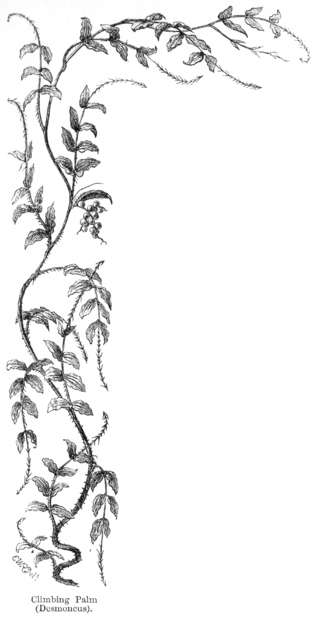
Desmoncus is a genus of mostly climbing, spiny palms native to the Neotropics. The genus extends from Mexico in the north to Brazil and Bolivia in the south, with two species present in the southeastern Caribbean.
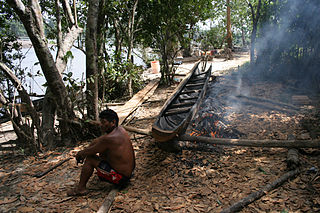
The Ye'kuana, also called Ye'kwana, Ye'Kuana, Yekuana, Yequana, Yecuana, Dekuana, Maquiritare, Makiritare, So'to or Maiongong, are a Cariban-speaking tropical rain-forest tribe who live in the Caura River and Orinoco River regions of Venezuela in Bolivar State and Amazonas State. In Brazil, they inhabit the northeast of Roraima State. In Venezuela, the Ye'kuana live alongside their former enemies, the Sanumá.

The following outline is provided as an overview of and topical guide to South America.

The Southern Common Market, commonly known by Spanish abbreviation Mercosur, and Portuguese Mercosul, is a South American trade bloc established by the Treaty of Asunción in 1991 and Protocol of Ouro Preto in 1994. Its full members are Argentina, Bolivia, Brazil, Paraguay and Uruguay. Venezuela is a full member but has been suspended since 1 December 2016. Associate countries are, Chile, Colombia, Ecuador, Guyana, Peru, and Suriname. Bolivia became a full member on July 8, 2024.
The Sudamérica Rugby Women's Sevens, is the regional championship for women's international rugby sevens in South America. It has been contested since 2004. The tournament is held over two days, typically on a weekend. It is sanctioned and sponsored by Sudamérica Rugby.

Dynamine is a genus of nymphalid butterflies found in South America.

Dynamine postverta, the Mylitta greenwing or four-spot sailor, is a butterfly in the family Nymphalidae. It is found throughout most tropical and subtropical areas of Central and South America, from Mexico south to Argentina and Paraguay. The habitat includes primary rainforests, humid deciduous woodlands, scrubby grassland and farmland at altitudes up to about 900 metres.
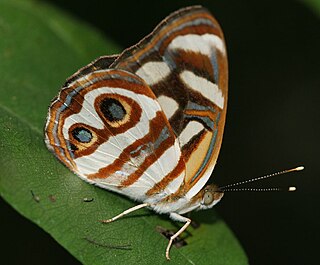
Dynamine dyonis, the blue-eyed sailor, is a species of tropical brushfoot in the butterfly family Nymphalidae. It is found in North America.
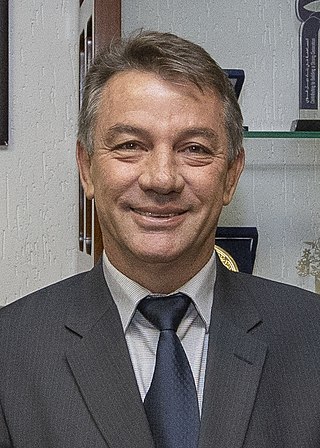
Antonio Oliverio García de Almeida is a Brazilian politician. He is the governor of the state of Roraima and member of the Progressive Party. A nationalist who opposes immigration, Denarium has advocated for closing Brazil's border with Venezuela in response to the Venezuelan refugee crisis. The inflow of migrants means that Roraima has a disproportionately higher Venezuelan Brazilian population compared to the rest of Brazil.

















